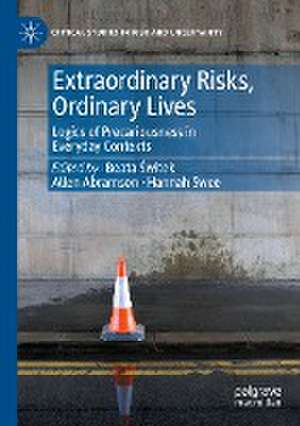Extraordinary Risks, Ordinary Lives: Logics of Precariousness in Everyday Contexts: Critical Studies in Risk and Uncertainty
Editat de Beata Świtek, Allen Abramson, Hannah Sweeen Limba Engleză Paperback – 30 mar 2023
| Toate formatele și edițiile | Preț | Express |
|---|---|---|
| Paperback (1) | 944.82 lei 6-8 săpt. | |
| Springer International Publishing – 30 mar 2023 | 944.82 lei 6-8 săpt. | |
| Hardback (1) | 950.03 lei 6-8 săpt. | |
| Springer International Publishing – 29 mar 2022 | 950.03 lei 6-8 săpt. |
Preț: 944.82 lei
Preț vechi: 1152.22 lei
-18% Nou
Puncte Express: 1417
Preț estimativ în valută:
180.79€ • 188.76$ • 149.63£
180.79€ • 188.76$ • 149.63£
Carte tipărită la comandă
Livrare economică 05-19 aprilie
Preluare comenzi: 021 569.72.76
Specificații
ISBN-13: 9783030839642
ISBN-10: 3030839648
Pagini: 336
Ilustrații: XVII, 336 p. 18 illus., 16 illus. in color.
Dimensiuni: 148 x 210 mm
Greutate: 0.43 kg
Ediția:1st ed. 2022
Editura: Springer International Publishing
Colecția Palgrave Macmillan
Seria Critical Studies in Risk and Uncertainty
Locul publicării:Cham, Switzerland
ISBN-10: 3030839648
Pagini: 336
Ilustrații: XVII, 336 p. 18 illus., 16 illus. in color.
Dimensiuni: 148 x 210 mm
Greutate: 0.43 kg
Ediția:1st ed. 2022
Editura: Springer International Publishing
Colecția Palgrave Macmillan
Seria Critical Studies in Risk and Uncertainty
Locul publicării:Cham, Switzerland
Cuprins
Chapter 1. Introduction: Ordinary life, extraordinary risk: On the normalisation of significant risk-taking in precarious contexts.- Part I. Self-Constitution: Defiance, endurance and choice.- Chapter 2. ‘Knowing how to walk’: Risk, violence and practices of endurance in urban Brazil.- Chapter 3. Risk negotiations in the mines of Potosí: Implications for rethinking current Health and Safety approaches.- Chapter 4. Regenerative medicine, unproven therapies and the framing of clinical risk.- Chapter 5. Commentary: Clear and present danger: Dodging and dealing with risk and uncertainty in everyday life.- Part II. Shifting dangers: Macro and micro politics of risk.- Chapter 6. ‘Keeping the conversation going’: Understanding risk in a context of escalating conflict in Syria.- Chapter 7. The Edgeworker’s Habitus: Climbing and Ordinary Risks.- Chapter 8. Commentary: Action, edgework, and the situated logics of risk.- Part III. Environmental threat and cultural possibility: Risk and the contemporary city.- Chapter 9. ‘Asılmak tehlikeli ve yasaktır’: Unintelligible mobility and uncertain manhood in Istanbul’s Old City.- Chapter 10. Ordinary life in the shadow of Vesuvius: Surviving the announced catastrophe.- Chapter 11. Keeping disasters under control: Anticipation, cyclones and responses to uncertainty.- Chapter 12. Commentary: Interpretive risk ethnography as a means of understanding risk problems: Encounters with the ordinary-extraordinary and what comes after?
Notă biografică
Beata Świtek is Assistant Professor at the Department of Cross-Cultural and Regional Studies, University of Copenhagen, Denmark.
Allen Abramson is a Senior Lecturer in Social Anthropology at University College London, UK.
Hannah Swee is a climate and capacity building specialist for the United Nations.
Textul de pe ultima copertă
This book untangles the relationship between expert categorisations of risk and the on-the-ground experiences of untrained ‘ordinary’ people who may be routinely subjected to significant danger in a variety of extraordinary contexts. It considers political, ethical and moral dimensions of risk and calls for more targeted ethnographic research, designed to reveal how grass-roots risk dispositions and practice intersect with official discourses, individual agency and community resilience.
Beata Świtek is Assistant Professor at the Department of Cross-Cultural and Regional Studies, University of Copenhagen, Denmark.
Beata Świtek is Assistant Professor at the Department of Cross-Cultural and Regional Studies, University of Copenhagen, Denmark.
Allen Abramson is a Senior Lecturer in Social Anthropology at University College London, UK.
Hannah Swee is a climate and capacity building specialist for the United Nations.
Caracteristici
Brings together long-term ethnographic research to redefine notions of risk Reveals how risk and risk categorizations are related to individual agency and community resilience Shows how societal risk can in fact forge new and positive forms of social experience









